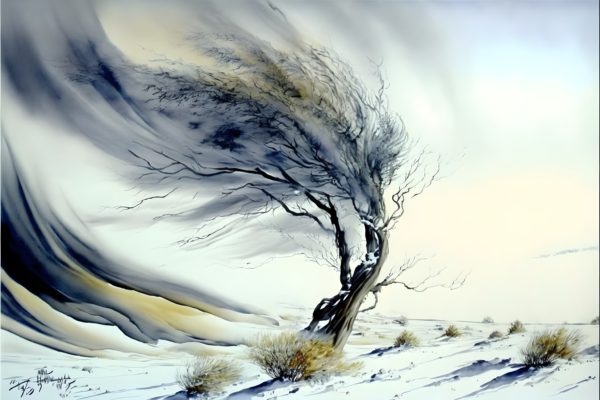
冬の始まりの風、木枯らしが連日、吹き荒れている。この季節特有の風は、秋の終わりを告げ、冬の到来を予感させる。
この風は、夏の緑豊かな景色から一転して、枝だけが残る寂しい風景を現出する。寂しさの中にも、冬の訪れと共に新たな始まりが潜んでいる。
木枯らしは季節の変わり目を体感させるものとしても重要だ。この風が吹くと、人々は温かい衣服を身に着け、家の中で過ごす時間が長くなり、日常生活にも大きな変化をもたらす。
木枯らしは、私たち人間にとって深い思索や内省の機会を提供する。この風が吹くと、一年の終わりが近づいていることを悟り、過ぎ去った時間を振り返るきっかけにもなる。また、冬の静けさの中で新たな年を迎える準備をするための、心の整理が存在する。
木枯らしは自然との繋がりを再確認する機会を与えてくれる。 都市生活で自然から遠ざかっている現代人にとって、この風は季節の変化を直接感じる貴重な瞬間だ。冬の到来を宣言するこの風は、自然界の一部としての私の存在を思い出させ、自然のリズムに耳を傾けることの大切さを教える。
木枯らしの吹くこの時期は、外見上は寒く、厳しいものかもしれないが、それは同時に内面的な豊かさを育む、特別な時期でもある。 自然の変化に耳を傾け、心の準備を整えることで、新たな季節を迎える準備ができるのである。
日本の四季の中で、木枯らしは特に詩的なイメージを持ち、多くの文学作品や芸術にインスピレーションを与えてくれた。
その厳しくも美しい風景は、作家や詩人たちにとって、感情や季節の移ろいを表現するための素晴らしいきっかけとなる。有名な俳句には、木枯らしを詠んだものがたくさん存在する。
『 木枯や竹に隠れてしづまりぬ 』(松尾芭蕉)
『 木枯や鐘に小石を吹きあてる 』(与謝蕪村)
『 こがらしやしのぎをけずる夜の声 』(小林一茶)
『 凩や弦のきれたる弓のそり 』(夏目漱石)
『 凩のうみ吹きなげるたまゆらや 』(芥川龍之介)
『 凩のラヂオをりをりきこえる 』(種田山頭火)
(ChatGPT 勝爺)2023-12
Poetry of a Kogarashi
The wind that marks the beginning of winter is blowing all day long. This seasonal wind heralds the end of autumn and foreshadows the arrival of winter.
This wind completely transforms the lush summer landscape into a lonely landscape with only branches left. Even in the midst of loneliness, a new beginning lurks with the arrival of winter.
Kogarashi is also important as a way to experience the change of seasons. When this wind blows, people wear warmer clothes and spend more time indoors, bringing about major changes in their daily lives.
Kogarashi provides an opportunity for deep thought and introspection for us humans. When this wind blows, we realize that the end of the year is approaching, and it also gives us a chance to look back on the time that has passed. There is also a way to organize your mind in order to prepare for the new year in the stillness of winter.
Kogarashi gives us an opportunity to reaffirm our connection with nature. For modern people who live in cities and live far away from nature, this breeze is a precious moment to directly feel the change of seasons. This wind, which announces the arrival of winter, reminds me of my existence as part of the natural world and teaches me the importance of listening to the rhythms of nature.
This time of year, when the wind blows, may seem cold and harsh on the outside, but it is also a special time that fosters inner richness. By listening to the changes in nature and preparing our hearts, we can prepare for the new season.
Among Japan's four seasons, Kogarashi has a particularly poetic image and has inspired many literary works and art.
Its harsh yet beautiful scenery provides writers and poets with a wonderful opportunity to express their emotions and the changing seasons. There are many famous haiku poems about kogarashi.
“Hide in the dead wood and bamboo and become silent” (Matsuo Basho)
“Blowing pebbles against the tree and the bell” (Yosa Buson)
“The voice of the night that scolds the palm trees” (Issa Kobayashi)
“A bow sled with broken bowstrings and bowstrings” (Natsume Soseki)
“Tamayuraya where the sea blows” (Ryuunosuke Akutagawa)
“I can hear the radio in the sky” (Taneda Santouka)




